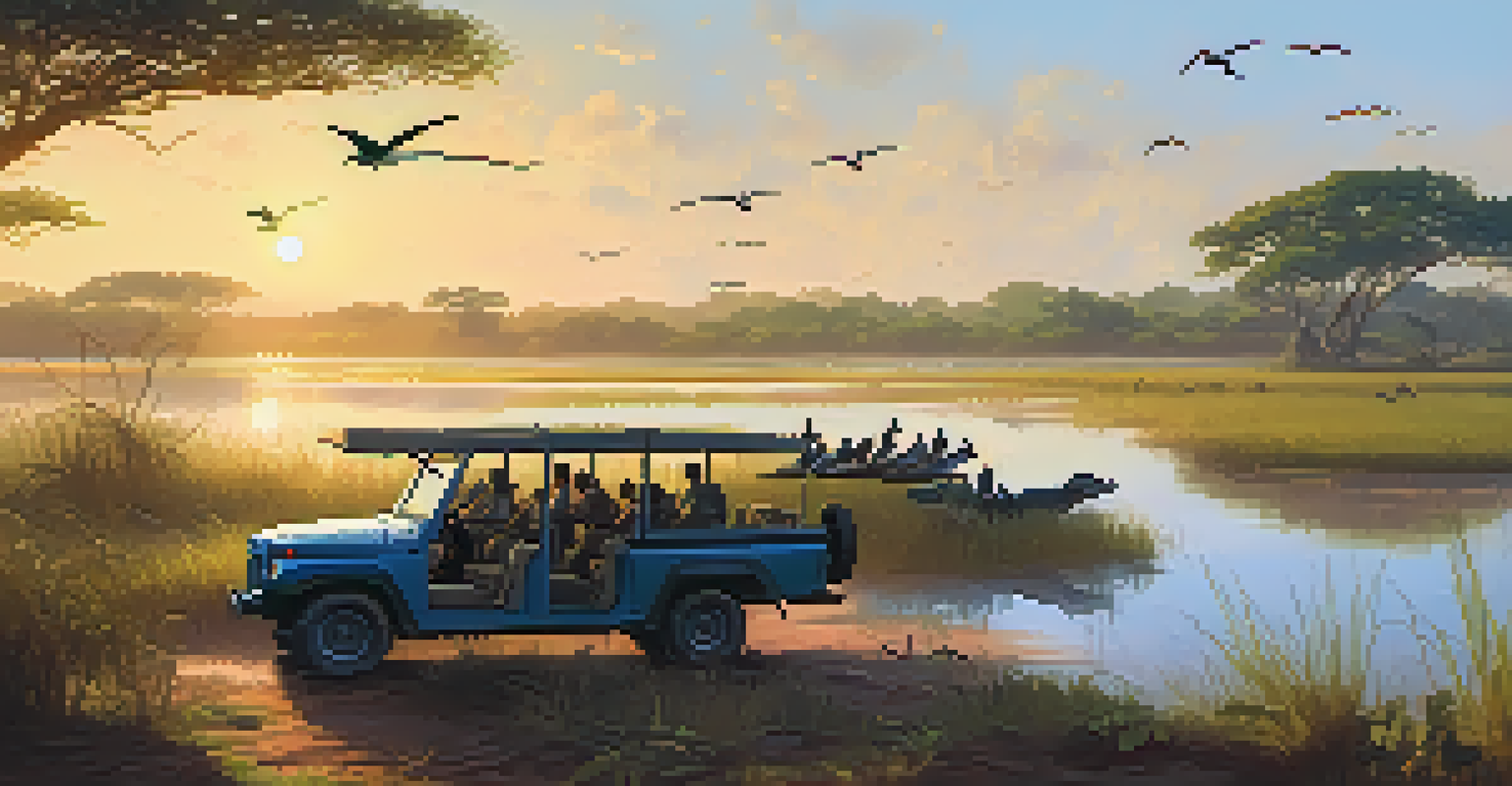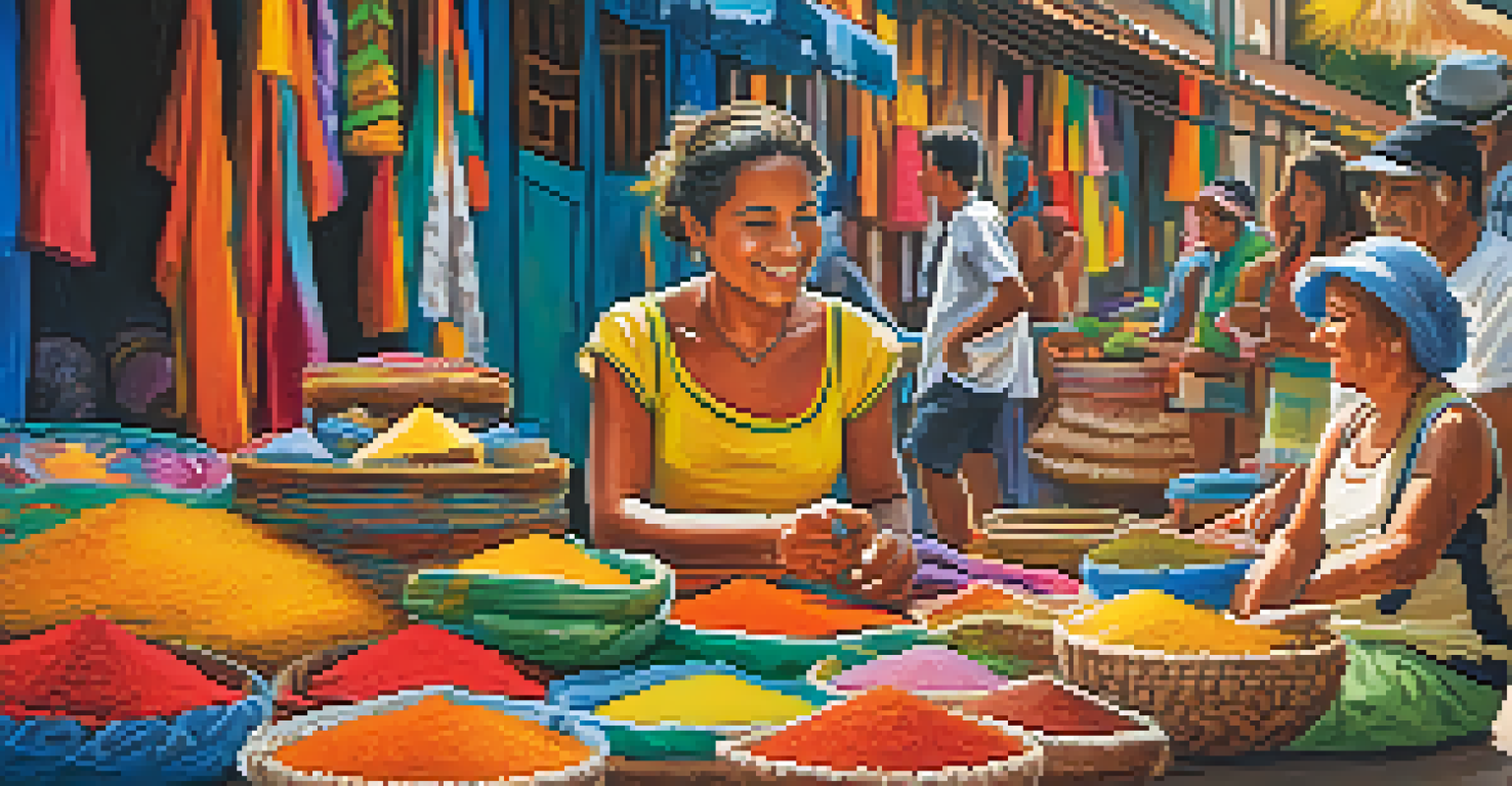Ecotourism in Brazil: A Guide to Wildlife Tours

Understanding Ecotourism: A Sustainable Travel Option
Ecotourism is a form of sustainable travel that focuses on experiencing natural environments while minimizing impact. In Brazil, this means immersing yourself in its stunning ecosystems, from the Amazon rainforest to the Pantanal wetlands. By choosing ecotourism, you not only enjoy breathtaking landscapes but also contribute to conservation efforts and support local communities.
The greatest threat to our planet is the belief that someone else will save it.
This travel style emphasizes responsible practices, such as using eco-friendly accommodations and participating in tours led by knowledgeable local guides. Such experiences enrich your understanding of biodiversity and the importance of protecting these habitats. For instance, a guided tour through the Amazon can reveal the secrets of this vast ecosystem while highlighting the threats it faces.
Ultimately, ecotourism in Brazil allows travelers to connect with nature in meaningful ways. It's an opportunity to learn, appreciate, and advocate for the preservation of the planet's treasures. So, if you're looking for an adventure that leaves a positive mark, ecotourism is your answer.
Top Wildlife Destinations for Ecotourism in Brazil
Brazil is home to some of the most diverse ecosystems on the planet, making it a prime destination for wildlife enthusiasts. Notable spots include the Amazon Rainforest, where jaguars, sloths, and countless bird species thrive. Another must-visit is the Pantanal, the world's largest tropical wetland, known for its rich wildlife, including capybaras, caimans, and hundreds of bird species.

The Atlantic Forest, although heavily fragmented, offers a unique glimpse into Brazil's coastal biodiversity. Here, you can find the endangered golden lion tamarin and a variety of exotic plants. Each of these destinations provides distinct experiences, allowing travelers to witness the beauty and fragility of nature firsthand.
Ecotourism Supports Conservation
Choosing ecotourism allows travelers to enjoy natural beauty while contributing to conservation efforts and supporting local communities.
Choosing the right destination often depends on the type of wildlife you want to see and the experiences you seek. Whether you’re interested in birdwatching, photographing wildlife, or simply immersing yourself in nature, Brazil’s diverse landscapes cater to every ecotourist's dream.
Planning Your Ecotourism Adventure in Brazil
When planning your ecotourism adventure, consider the best time to visit each region. For example, the dry season from May to September is ideal for visiting the Pantanal, as wildlife becomes more visible near water sources. Meanwhile, the Amazon's wet season, from December to May, enhances river tours and offers incredible opportunities for spotting diverse species.
Traveling – it leaves you speechless, then turns you into a storyteller.
It's also essential to research eco-friendly accommodations that prioritize sustainability. Many lodges and hotels in ecotourism areas actively engage in conservation efforts. Choosing these options not only supports responsible tourism but also enhances your experience by connecting you more deeply with the environment.
Lastly, make sure to pack appropriately for your destination. Lightweight, breathable clothing, insect repellent, and binoculars for wildlife spotting are must-haves. Being prepared ensures that you can fully enjoy the stunning vistas and unique wildlife Brazil has to offer.
Responsible Wildlife Viewing: Best Practices
Responsible wildlife viewing is crucial in ensuring that our presence does not disturb animals or their habitats. When observing wildlife, maintain a safe distance and avoid feeding or approaching them. This respect not only protects the animals but also preserves their natural behaviors, allowing for a more authentic experience.
Using a guide can significantly enhance your wildlife viewing experience. Guides are trained to track animals and understand their behaviors, ensuring that you’re in the right place at the right time. They also educate travelers about the ecosystem, providing insights that deepen your appreciation for what you’re witnessing.
Wildlife Viewing Requires Responsibility
Responsible wildlife viewing practices are essential to protect animals and their habitats, ensuring a sustainable ecotourism experience.
Lastly, always follow the guidelines set by your tour operators and local regulations. These rules are in place to protect both the wildlife and the environment. By adhering to these practices, you contribute to the sustainability of ecotourism in Brazil and help preserve its incredible biodiversity for future generations.
Popular Wildlife Tours in Brazil You Can't Miss
Brazil offers a plethora of wildlife tours that cater to different interests and experiences. The Amazon River cruises are particularly popular, providing a unique vantage point to explore the jungle and spot wildlife like pink dolphins and parrots. These tours often combine relaxation with adventure, making it an excellent choice for those wanting to unwind while immersed in nature.
In the Pantanal, guided safaris are a fantastic way to observe wildlife up close. These tours typically include open-air vehicles that allow for excellent visibility and photography opportunities. Imagine driving through the wetlands at sunrise, watching as caimans bask in the early light while colorful birds flit overhead—it’s a photographer's dream!
For those interested in a more immersive experience, consider multi-day treks in the Atlantic Forest. These hikes not only offer breathtaking views but also the chance to encounter unique wildlife along the trails. From vibrant orchids to playful monkeys, every step unveils the hidden wonders of this lush environment.
Engaging with Local Communities Through Ecotourism
One of the most rewarding aspects of ecotourism is the opportunity to engage with local communities. Many ecotourism initiatives in Brazil involve indigenous and local people, who share their knowledge of the land and traditions. Participating in cultural activities, such as traditional crafts or cooking classes, enriches your travel experience and fosters mutual respect.
Supporting local businesses through your travel choices directly benefits the communities you visit. This can include dining at locally-owned restaurants, purchasing handmade crafts, or participating in community-led tours. By investing in these experiences, you contribute to the preservation of their culture and environment.
Engagement with Local Cultures
Ecotourism fosters meaningful connections with local communities, enhancing travel experiences while promoting cultural and environmental preservation.
Moreover, many ecotourism programs actively involve locals in conservation efforts. This not only empowers communities but also highlights the importance of preserving their natural resources for future generations. Engaging with local culture adds depth to your travel experience while fostering a sense of global responsibility.
The Future of Ecotourism in Brazil: Challenges and Opportunities
As ecotourism continues to grow in Brazil, it faces both challenges and opportunities. Deforestation, climate change, and habitat loss threaten the very ecosystems that attract travelers. Addressing these issues requires a collective effort from governments, businesses, and travelers alike to promote sustainable practices and conservation initiatives.
On the positive side, increased awareness about the importance of preserving biodiversity has led to more eco-friendly initiatives and support for conservation projects. Many organizations are working tirelessly to protect endangered species and restore damaged habitats, providing travelers with the chance to contribute to these efforts during their visits.

The future of ecotourism in Brazil hinges on the balance between tourism and conservation. By being responsible travelers and supporting sustainable practices, we can enjoy the beauty of Brazil's wildlife while ensuring that these precious ecosystems thrive for years to come. Together, we can create a brighter future for both the environment and travelers.